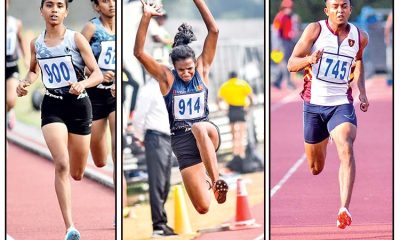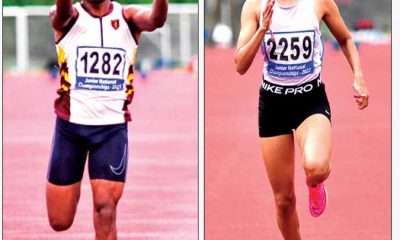Sports
Medal-winning coaches yet to be rewarded
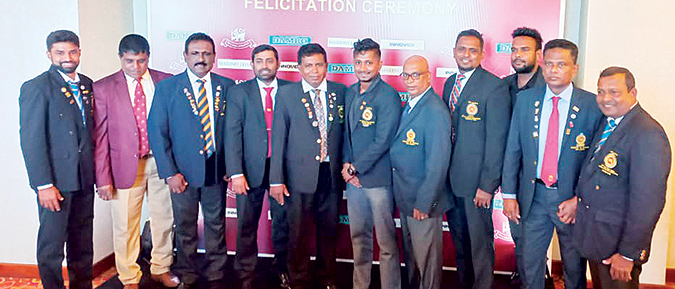
by Reemus Fernando
The historic achievement of track and field athletes at the recently held Asian Athletics Championships is still causing ripples across the sporting arena. From Tharushi Karunaratne’s record-breaking 800 metres triumph to men’s 4×400 metres relay team’s heroics are being appreciated by all and sundry. The medal winners have been rightly rewarded with the support of the cooperate sector. However the untiring efforts of the true heroes, the medal-producing coaches have gone unrewarded.
The achievement in Thailand was not a miracle. From planting the seeds of belief in these athletes years before they even realized their true potential to peaking them at the right moment to win medals there had been many untold responsibilities undertaken by their respective coaches. The medals were the result of years of hard work and planning by the coaches. The veteran athletes who won medals had been training under these coaches for years. Even during times when no one dared to take up sports. When the country’s sports hierarchy went into a deep slumber during the corona-induced lockdown periods and when even some of their fellow athletes abandoned all hope during the economic crisis these dedicated coaches had motivated their athletes to persevere in their respective disciplines.
In Sri Lanka, the coach’s job goes beyond the boundaries of the playground. It is the coaches who identify the true potential of the athlete, educate their parents of the future potential and even take care of the various needs of the athletes. It should be stated here that a vast majority of the country’s track and field athletes come from not so well to do families. Training such athletes for highly demanding events is no easy task.
The gold-winning 400 metres sprinter Nadeesha Ramanayake was a sixth-place finisher in a 3,000 metres race when she first took part in a Junior National Championship. It was no easy task to introduce and train an athlete who had not won at the junior level a discipline once dominated by a legend like Damayanthi Dharsha. Hadn’t Muddika Thushara identified Ramanayake’s potential at Weeraketiya a decade ago Sri Lanka would not have ended more than two decades of wait for an individual 400 metres gold at the Asian Championship last month.
Sajith Jayalal had been a great source of strength to double bronze medallist Gayanthika Abeyratne for more than a decade. In a sport where rewards are hard to come by just persevering for over a decade in itself is worthy of being rewarded. Had Jayalal decided to be in the comfort of his office at the National Institute of Sports Sciences without parting his knowledge, the likes of Gayanthika and the dozens of athletes from the tri forces would have either given up the sport or be producing substandard performances.
Has any administrator in the Sports Ministry or the Ministry of Education or any other authority ever appreciated Susantha Fernando’s contribution to athletics? Has he ever been appreciated for the many medallists he has produced for Sri Lanka at Asian Youth Championships, Asian Junior Championships, Asian Championships, South Asian Games or open championships? His trainees have gone on to own almost all age category 800 metres national records. Has there been any appreciation at the national level for the yeoman service he has rendered for decades at Ratnayake Central Walala? Tharushi Karunaratne would have given up track and field sport after the ordeal she had to go through at Digana and the unpleasant experience she had to face due to the faux pas in the run-up to the Junior World Championships last year. If not for the mediation of Fernando, Tharushi would have hung up her spikes before her schooldays were over.
Pradeep Nishantha who trains Dilhani Lekamge (bronze medallist of the women’s javelin throw) is the coach to many leading throwers of the country including Paralympics medallists. His guidance has changed the lives of many athletes.
Aruna Dharshana’s journey from Seruwila to Akuramboda would have been meaningless hadn’t Asanka Rajakaruna gone out of his way to help the budding athlete. Many appreciated the performances of Dharshana when he returned from Gifu with the Asian Junior Championship record against his name in 2018. Except the coach not many were behind him when he could not replicate such performances in the immediate aftermath. Sri Lanka may not have won an individual medal in the men’s 400 metres but the men’s 4×400 metres team inclusive of Dharshana were able to create history in Thailand and their time produced to win the relay gold stands as one of the best performances of the globe this year. The other coaches of the men’s relay team members namely Vimukthi de Soyza (Kalinga Kumarage), Daminda Bandara (Pasindu Kodikara), S.P.D. Silva (Pabasara Niku), Harijan Rathnayake (Rajitha Rajakaruna) and Ravindu Theekshana and Anuradha Nanayakkara who train women’s relay team members Nishendra Fernando and Lakshima Mendis respectively have similar stories behind the medal-winning heroics.
Sri Lanka’s track and field owes its success to the many coaches who toil from dawn to dusk to hone the skills of their charges. A vast majority of them do a voluntary job. Hence the coaching fraternity well aware of the service they render were shocked when the medal-winning coaches had to return home empty-handed from a recently held function where their charges were rewarded with handsome cash awards for the medals they won at the Asian Athletics Championships.
Years ago the Ministry of Sports introduced a scheme to reward coaches when their athletes win international medals. What the track and field athletes achieved last month in Thailand was a historic accomplishment which deserves sports ministry backing. The Sports Ministry is yet to act more than two weeks after the athletes had returned home. Having provided their services free of charge these coaches may not ask for cash rewards but it is incumbent upon authorities to reward them appropriately. That will be a huge morale boost for the rest of the coaching fraternity.
The Country’s Sports hierarchy has failed to capitalize on historic track and field achievements be it Olympic medallist Susanthika Jayasinghe’s triumphs at the World level or the epic sub ten seconds 100 metres dash of Italy-based sprinter Yupun Abeykoon. What will be the legacy of the historic Asian Championship triumph?
Sports
England face Australia in the battle of champions
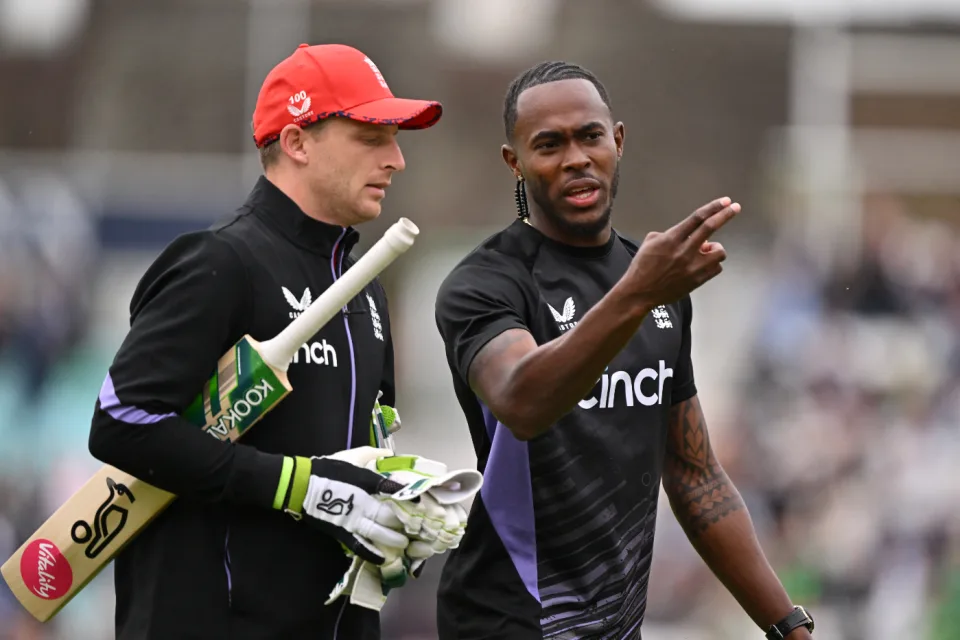
The first truly heavyweight clash of this expanded T20 World Cup format comes freighted with both history and subplots. A rematch of the 2010 World T20 final at Kensington Oval, the match pits Jos Buttler’s defending champions – who are aiming to become the first team to retain the trophy – against the Australian winning machine, victors at the 2021 edition and current world title-holders in Test and ODI cricket. And that’s before you throw in the Ashes for afters.
Already there is added pressure on England, after the rain in Bridgetown led to a share of the points in their opener against Scotland (and that having conceded 90 runs from 10 overs without taking a wicket in a tepid bowling display). Lose to their oldest rivals and it will leave their Super 8 prospects open to being waylaid by the perils of net run-rate calculations, or worse.
The Scotland match was the third abandonment in five suffered by England, after a rain-affected home series against Pakistan, which has clearly hampered their readiness for this campaign after almost six months without playing T20 together. It does not take much for a side to click in this format – and England looked in decent shape when they did get on the field against Pakistan – but Buttler will be anxious for things to go their way on Saturday, if only to avoid further questions referencing the team’s disastrous ODI World Cup defence last year.
Australia, under the laidback leadership of Mitchell Marsh would love nothing more than to add to the English sense of jeopardy – having helped bundle them out of the tournament in India on the way to taking the crown. Their head to head record is less impressive in T20 however, with England having won six of the last seven completed encounters, as well as that 2010 final.
Despite a wobble with the bat, Australia avoided mishap against Oman earlier in the week, the experience of David Warner and Marcus Stoinis shining through in difficult batting conditions. Surfaces in the Caribbean – not to mention those games staged in the USA – have already had teams scratching their heads; rather than the “slug-fest” England had prepared for, following a high-scoring tour of the Caribbean in December, it looks as if boxing smart may be the way to go.
Speaking of Warner, this could be the last time he faces up against England in national colours – and another match-winning contribution would likely reduce the chances of them meeting again in the knockouts. On the other side of the card is Jofra Archer, fresh from an emotional maiden outing at Kensington Oval and ready to take on Australia for the first time in any format since 2020. Can Mark Wood fire up England’s campaign, as he did during last summer’s Ashes? Will Pat Cummins be back to harass the old enemy once again? Seconds out, it’s almost time to rumble.
Cummins is set to return after being rested for the Oman game, which saw Mitchell Starc leave the field with cramp. Starc is understood to be fine and could keep his place – which would likely see Nathan Ellis miss out. Marsh is still not fit to bowl, with Australia likely to continue with the allrounder combination of Stoinis and Maxwell to give them cover.
Australia (probable XI): David Warner, Travis Head, Mitchell Marsh (capt), Glenn Maxwell, Marcus Stoinis, Josh Inglis (wk), Tim David, Pat Cummins, Nathan Ellis/Mitchell Starc, Adam Zampa, Josh Hazlewood
The one change England may consider is Reece Topley coming in for Wood, with the expectation that there will be some rotation among the seamers through the course of the tournament.
England (probable XI): Phil Salt, Jos Buttler (capt & wk), Will Jacks, Jonny Bairstow, Harry Brook, Liam Livingstone, Moeen Ali, Chris Jordan, Jofra Archer, Adil Rashid, Reece Topley/Mark Wood
[Cricinfo]
Sports
South Africa up against their bogey team in batter-unfriendly New York
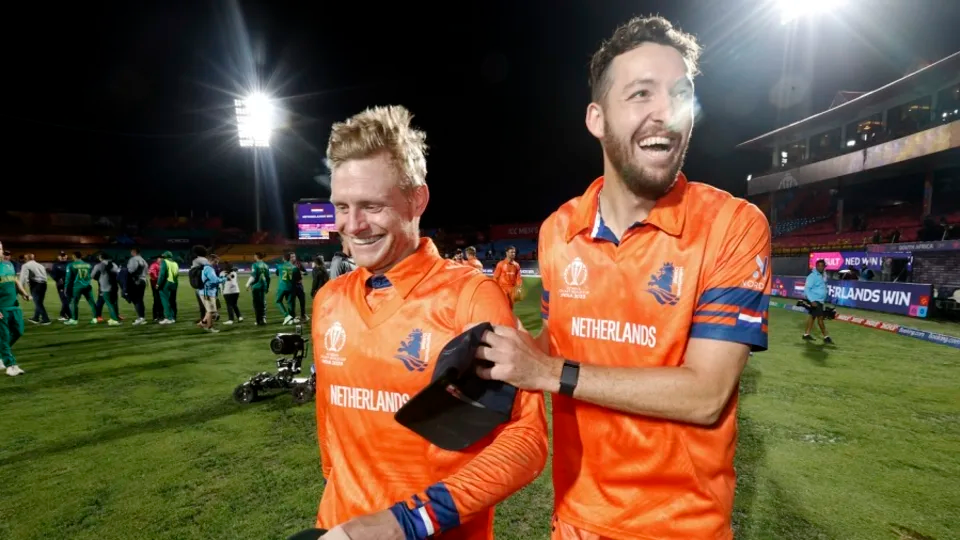
Once is coincidence, twice is a clue, and three times is proof.
To paraphrase Agatha Christie, that is the narrative around South Africa’s meeting with Netherlands at this T20 World Cup.
The Dutch beat South Africa at the 2022 tournament and ended their semi-final hopes in a match where South Africa appeared to be sleep walking, and then beat them again at the 2023 ODI World Cup, where they exposed South Africa’s vulnerability in the chase. If they to do the treble, not only will Netherlands take the lead in Group D, but they will offer conclusive evidence of the threat they pose to Full Members, especially South Africa.
Of course, it will take some doing after South Africa’s opening performance against Sri Lanka, where they reduced their opposition to their lowest T20I total and chased it down in fairly straightforward fashion thanks to the most stable middle-order of their white-ball era. In Aiden Markram, Tristan Stubbs, Heinrich Klaasen and David Miller, South Africa have bankers and big-hitters and, for this match, they also have the advantage of experience. They’ve already played at Eisenhower Park, and have first-hand knowledge that run-scoring doesn’t come easily;Klassen said they are prepared to use their “cricket brains” and play “smarter cricket”.
But the conditions could be good news for Netherlands, who are not naturally a line-up of big hitters and build their innings on a foundation of turning ones into twos. In other words, they tend to take a slightly more conservative approach to batting, which may work well here, but they’ll be wary of the uneven bounce of the surface and will have to come up with plans to counterattack especially against South Africa’s seamers. Their own bowlers were exemplary in Dallas and will look to build on that performance against a line-up that will likely be more proactive than Nepal’s, but who they have managed to keep quiet not once, but twice in the past. Third time’s the charm, they say.
Anrich Nortje’s stunning return to form against Sri Lanka means South Africa may not have to tinker with the bowling combination, and Gerald Coetzee and Tabraiz Shamsi may have to wait their turns to get a game. The batting line-up should be unchanged, with no space for Ryan Rickelton yet.
South Africa: Quinton de Kock (wk), Reeza Hendricks, Aiden Markam, Tristan Stubbs, Heinrich Klaasen (wk), David Miller, Marco Jansen, Keshav Maharaj, Kagiso Rabada, Ottneil Baartman, Anrich Nortje
Conditions in New York may tempt Netherlands to include an extra seamer and they have Kyle Klein in their squad. But it could come at the expense of a shortened batting line-up and they may not want to risk that.
Netherlands: Michael Levitt, Max O’Dowd, Vikramjit Singh, Sybrand Engelbrecht, Scott Edwards (capt, wk), Bas de Leede, Teja Nidamanuru, Logan van Beek, Tim Pringle, Paul van Meekeren, Vivian Kingma
[Cricinfo]
Latest News
Mustafizur, Rishad, Hridoy dazzle in Bangladesh’s tight two-wicket win over Sri Lanka
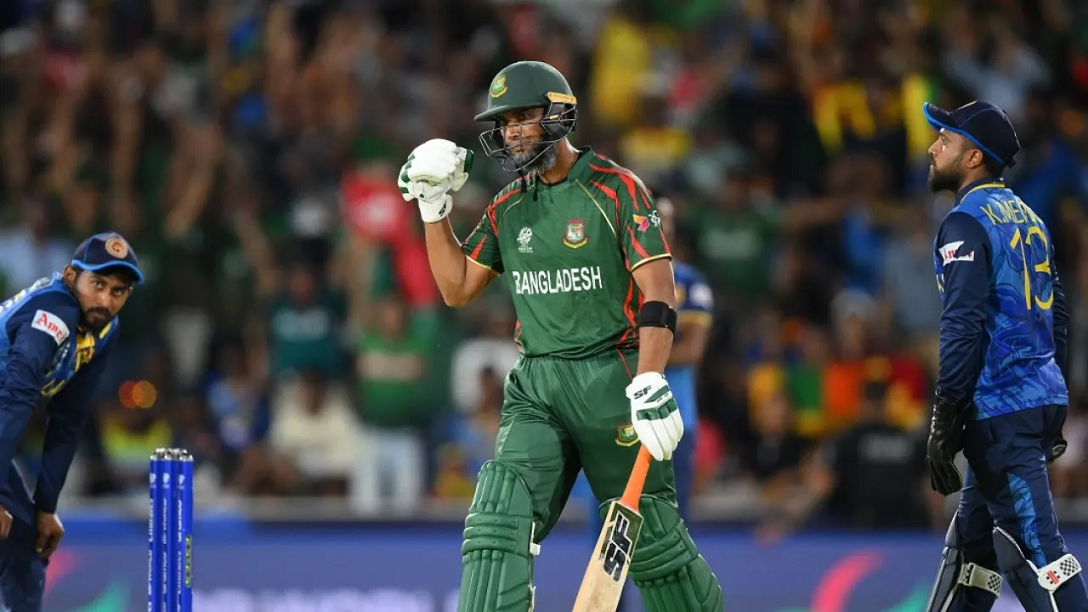
Nuwan Thushara’s last over brought Sri Lanka screaming back into the match,as he first bowled Rishad Hossain, and then nailed Taskin Ahmed in front of the stumps with a pinpoint swinging yorker. This left Bangladesh eight wickets down, with 12 runs still to get.
However, the experienced Mahmudullah was at the crease for Bangladesh, and despite some further nervy moments, pushed Bangladesh across the line off the last ball of the 19th over.
But this was a match chiefly decided by Bangladesh’s own outstanding bowling. Mustafizur Rahman was the best among them, using shorter lengths and his cutters efficiently, to claim figures of 3 for 17. Rishad Hossain’s three-for through the middle overs also kept Sri Lanka quiet.
Mustafizur was instrumental in Sri Lanka’s downward spiral through the middle overs, which culminated in a crash-and-burn end. Ultimately, their inability to find boundaries, or even rotate strike against good Bangladesh bowling resulted in their downfall. A score of 125 for 9 always seemed poor on a decent pitch, even if their bowlers made a match of it in the end.
Brief scores:
Bangladesh 125 for 8 in 19 overs (Towhid Hridoy 40, Litton Das 36; Dhanajaya de Silva 1-11, Nuwan Thushara 4-18, Wanidu Hasaranga 2-32, Matheesha Pathirana 1-27) beat Sri Lanka124 for 9 in 20 overs (Pathum Nissanka 47, Dhananjaya de Silva 21; Tanzim Hasan Sakib 1-24, Taskin Ahmed 2-25, Mustafizur Rahman 3-17, Rishad Hossain 3-22) by two wickets
[Cricinfo]


